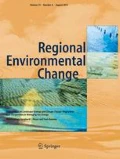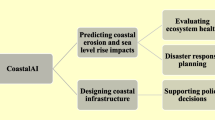Abstract
Within the context of a changing climate, scientists are called to engage directly with agricultural stakeholders for the coproduction of relevant information that will support decision making and adaptation. However, values, beliefs, identities, goals, and social networks shape perceptions and actions about climate change. Engagement processes that ignore the socio-cultural context within which stakeholders are embedded may fail to guide adaptive responses. To facilitate dialog around these issues, the Southeast Climate Consortium and the Florida Climate Institute formed a climate learning network consisting of row crop farmers, agricultural extension specialists, researchers, and climate scientists working in the Southeast US. Regional in scope, the learning network engages researchers and practitioners from Alabama, Georgia, and Florida as partners in adaptation science. This paper describes the ongoing interactions, dialog, and experiential learning among the network’s diverse participants. We illustrate how participatory tools have been used in a series of workshops to create interactive spaces for knowledge coproduction. For example, historical timelines, climate scenarios, and technology exchanges stimulated discussions about climate-related risk management. We present findings from the workshops related to participants’ perspectives on climate change and adaptation. Finally, we discuss lessons learned that may be applicable to other groups involved in climate education, communication, and stakeholder engagement. We suggest that the thoughtful design of stakeholder engagement processes can become a powerful social tool for improving decision support and strengthening adaptive capacity within rural communities.



Similar content being viewed by others
References
Averyt K (2010) Are we successfully adapting science to climate change? American Meteorological Society Insights and Innovation in BAMS, June 2010
Bartels W, Furman CA, Royce F, Ortiz B, Zierden D, Fraisse C (2012) Developing a learning community: Lessons from a climate working group for agriculture in the Southeast USA. Southeast Climate Consortium Technical Report Series: 12-002
Breuer NE, Fraisse CW, Hildebrand PE (2009) Molding the pipeline into a loop: the participatory process of developing AgroClimate, a decision support system for climate risk reduction in agriculture. J Serv Climatolo 3:1–12
Cash DW, Buzier J (2005) Knowledge—action systems for seasonal to interannual climate forecasting: summary of a workshop. National Academy Press, Washington, DC
Cerf M, Jeuffroy M, Prost L, Meynard J (2012) Participatory design of agricultural decision support tools: taking account of the use situations. Agron Sustain Dev 32:899–910
Cohen SJ (2010) From observer to extension agent—using research experiences to enable proactive responses to climate change. Climatic Change 100:131–135
Collins K, Ison R (2009) Jumping off Arnstein’s ladder: social learning as a new policy paradigm for climate change adaptation. Environmental policy and governance. Env Pol Gov 19:358–373
Crane TA, Roncoli C, Hoogenboom G (2011) Adaptation to climate change and climate variability: the importance of understanding agriculture as performance. Wageningen J Life Sci 57:179–185
Dilling L, Lemos MC (2011) Creating usable science: opportunities and constraints for climate knowledge use and their implications for policy. Glob Environ Change 21:680–689
Eriksen C, Prior T (2011) The art of learning: wildfire, amenity migration and local environmental knowledge. Int J Wildland Fire 20:612–624
Finucane, M. (2009) Why science along won’t solve the climate crisis: managing climate risks in the Pacific. Asia Pacific Issues. Analysis from the East–West Center #89
Fraisse C, Breuer N, Zierden D, Ingram K (2009) From climate variability to climate change: challenges and opportunities to extension. J Ext 47(2). doi:10.1088/1755-1307/6/4/242015. http://www.joe.org/joe/2009april/a9.php
Furman C, Roncoli C, Crane T, Hoogenboom G (2011) Beyond the “fit”: introducing climate forecasts among organic farmers in Georgia (United States). Clim Change 109(3–4):791–799
Halofsky JE, Peterson DL, Furniss MJ, Joyce LA, Millar CI, Nielson RP (2011) Workshop approach for developing climate change adaptation strategies and actions for natural resource management agencies in the United States. J For 109(4):219–225
Harvey B, Carlile E, Ensor J, Garside B, Patterson Z (2012) Understanding context in learning-centred approaches to climate change communication. IDS Bulletin 43(5)
Huntington HP, Brown-Schwalenberg PK, Fernandez-Gimenez ME, Frost KJ, Norton DW, Rosenberg DH (2002) Observations on the workshop as a means of improving communication between holders of traditional and scientific knowledge. Environ Manage 30(6):778–792
Jakku E, Thornburn PJ (2010) A conceptual framework for guiding the participatory development of agricultural decision support systems. Agric Syst 103(9):675–682
Jones JW, Bartels W, Fraisse C, Boote KJ, Ingram KT, Hoogenboom G (2010) Use of crop models for climate-agricultural decisions. In: Hillel D, Rosenzweig C (eds) Chapter in Climate Change and Agroecosystems: Impacts, Adaptation, and Mitigation. Imperial College Press, London UK
Karl TR, Melillo JM, Peterson TC (eds.) (2009) Global Climate Change Impacts in the United States, Cambridge University Press
Kolb DA (1984) Experiential learning: Experience as the source of learning and development. Prentice-Hall, New Jersey
Kolb AY, Kolb DA (2005) Learning styles and learning spaces: enhancing experiential learning in higher education. Acad Manage Learning Education 4(2):193–212
Kunkel et al. (2012) Climate of the Southeast U.S. National Climate Assessment, U.S. Global Change Research Program
Marx SM, Weber EU, Orlov BS, Leiserowitz A, Krantz DH, Roncoli C, Phillip J (2007) Communication and mental processes: experiential and analytic processing of uncertain climate information. Glob Environ Change 17:47–58
Meinke H, Howden SM, Struik PC, Nelson R, Rodriguez D, Chapman SC (2009) Adaptation science for agriculture and natural resource management: urgency and theoretical basis. Curr Opin Environ Sustain 1:69–76
Misra V, Carlson E, Craig RK, Enfield D, Kirtman B, Landing W, Lee S-K, Letson D, Marks F, Obeysekera J, Powell M, Shin S-l (2011) Climate scenarios: a Florida-Centric view, Florida Climate Change Task Force. http://floridaclimate.org/whitepapers/
Moser SC, Ekstrom JA (2011) Taking ownership of climate change: participatory adaptation planning in two local case studies from California. J Environ Stud Sci 1:63–74. doi:10.1007/s13412-011-0012-5
Peterson ND, Broad K, Orlove B, Roncoli C, Taddei R, Velez M (2010) Participatory processes and climate forecast use: socio-cultural context, discussion, and consensus. Clim Dev 2:14–29
Portmann RW, Solomon S, Hegel GC (2009) Spatial and seasonal patterns in climate change, temperatures, and precipitation across the United States. Proc Nat Acad Sci 106:7324–7329
Romsdahl RJ, Pyke CR (2009) What does decision support mean to the climate change research community? Clim Change 95(1–2):1–10
Roncoli C, Crane T, Orlove B (2008) Fielding climate change in cultural anthropology. In: Crate S, Nuttall M (eds) Anthropology and climate change: from encounters to action. Left Coast Press, Walnut Creek, pp 87–115
Roncoli C, Jost C, Kirshen P, Sanon M, Ingram K, Woodin M, Some L, Ouattara F, Sanfo J, Sia C, Yaka P, Hoogenboom G (2009) From accessing to assessing forecasts: an end-to-end study of participatory forecast dissemination in Burkina Faso (West Africa). Clim Change 92(3):433–460
Sakakibara C (2008) Our home is drowning: iñupiat storytelling and climate change in Point Hope. Alaska Geogr Rev 98(4):456–475
Trenberth KE et al (2007) Observations: surface and atmospheric climate change. Climate change 2007: the physical science basis. In: Solomon S et al (eds) Contribution of working group I to the Fourth Assessment Report of the Intergovernmental Panel on Climate Change. Cambridge University Press, UK, pp 235–336
Tschakert P, Dietrich KA (2010) Anticipatory learning for climate change adaptation and resilience. Ecol Soc 15(2):11
USDA (1981) Census of Agriculture 2007: United States Summary and State Data. http://usda.mannlib.cornell.edu/usda/AgCensusImages/1978/01/51/1978-01-51.pdf
USDA (2009a) Census of Agriculture 2007: United States Summary and State Data. http://www.agcensus.usda.gov/Publications/2007/Full_Report/usv1.pdf
USDA (2009b) Census of Agriculture 2007: Farm and Ranch Irrigation Survey 2008. http://www.agcensus.usda.gov/Publications/2007/Online_Highlights/Farm_and_Ranch_Irrigation_Survey/fris08.pdf
Weber EU, Stern PC (2011) Public understanding of climate change in the United States. Am Psychol 66(4):315–328
Acknowledgments
Special thanks are extended to all row crop producers and county extension agents who have participated in the climate learning network. Their generous time, curiosity, and consistent feedback have made this work possible. We also acknowledge the dedication and support from partners within Cooperative Extension services of three Southeast universities: John Beasley & Bob Kemerait (UGA), David Wright (UF), William Birdsong (UA). Thanks to researchers within the SECC and FCI: Gerrit Hoogenboom, Carla Roncoli, Mark Boudreau, Michael Thomas, Scott Templeton, Christine Engels, and Emily Rodriguez. Jennifer Arnold and Matthew Palumbo offered invaluable editing on the manuscript. We have benefited from the relationships and funds generated through the National Commission on Energy Policy (NCEP)—Iconic Agricultural Crops: Climate Change Impacts on Peanut, Cotton, and Corn in Georgia and Florida, the National Institute of Food and Agriculture (NIFA)—Climate variability to climate change: Extension challenges and opportunities in the Southeast USA, and the National Oceanic & Atmospheric Administration (NOAA).
Author information
Authors and Affiliations
Corresponding author
Rights and permissions
About this article
Cite this article
Bartels, WL., Furman, C.A., Diehl, D.C. et al. Warming up to climate change: a participatory approach to engaging with agricultural stakeholders in the Southeast US. Reg Environ Change 13 (Suppl 1), 45–55 (2013). https://doi.org/10.1007/s10113-012-0371-9
Received:
Accepted:
Published:
Issue Date:
DOI: https://doi.org/10.1007/s10113-012-0371-9




